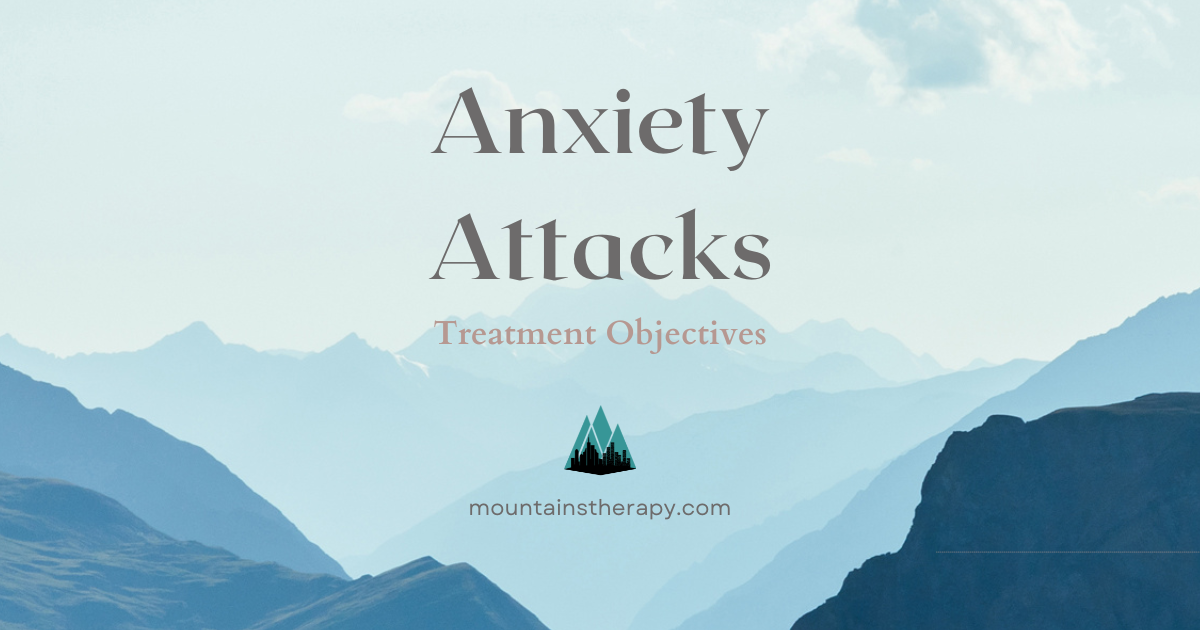Treatment Objectives for Anxiety Attacks: A Comprehensive Guide to Managing Symptoms
Learn more about Counseling for Anxiety Attacks here.
Anxiety attacks, or panic attacks, are sudden, intense episodes of fear or discomfort that often occur without warning. The physical and emotional symptoms such as chest pain, difficulty breathing, and a fear of losing control can be overwhelming. At Mountains Therapy, we specialize in helping individuals manage and overcome anxiety attacks. In this blog, we will focus on the treatment objectives for anxiety attacks and how our anxiety therapists use tailored techniques to provide lasting relief.
Understanding Anxiety Attacks
Anxiety attacks are marked by the sudden onset of symptoms, including rapid heart rate, difficulty breathing, dizziness, and overwhelming fear. They can happen unexpectedly, making it difficult to manage them in real-time. This is why anxiety treatment specifically targeting anxiety attacks is crucial for helping individuals regain control over their emotional well-being. The goal of treatment is not just to alleviate the attacks but also to help clients prevent them from happening in the future.
Treatment Objectives for Anxiety Attacks
Effective treatment for anxiety attacks includes a combination of strategies that help clients manage their immediate symptoms and reduce the frequency of attacks over time. Some key treatment objectives for anxiety attacks include:
1. Reducing the Intensity and Frequency of Anxiety Attacks
- One of the primary goals in anxiety counseling is to reduce the severity and frequency of anxiety attacks. Through Cognitive Behavioral Therapy (CBT), clients can learn to identify the thoughts and behaviors that trigger anxiety and panic. By challenging irrational beliefs and replacing them with more balanced thoughts, individuals can prevent the buildup of anxiety that leads to an attack.
2. Teaching Coping Mechanisms for Immediate Relief
- When an anxiety attack occurs, anxiety attack treatment focuses on providing immediate relief. Techniques such as deep breathing, grounding exercises, and progressive muscle relaxation are essential to calming the body's physiological response to panic. These tools help slow down the physical symptoms—like rapid heartbeat and shallow breathing allowing clients to regain a sense of control during an attack.
3. Increasing Emotional Awareness and Regulation
- A key part of anxiety treatment is teaching clients to be more aware of their emotions and triggers. By learning to recognize early signs of anxiety, such as increased heart rate or shallow breathing, clients can implement coping mechanisms before the situation escalates. Mental health therapy for anxiety attacks focuses on helping clients regulate their emotions, so they don't feel overwhelmed by their feelings of fear or panic.
4. Preventing Future Anxiety Attacks
- While anxiety attack treatment in NJ can help during an attack, long-term goals often focus on reducing the likelihood of future attacks. By identifying common triggers and avoiding known stressors, clients can work to prevent attacks from happening. Additionally, lifestyle changes, such as improving sleep habits, exercise, and stress management, play a big role in minimizing the occurrence of anxiety attacks.
Common Questions About Anxiety Attacks and Treatment
Are Anxiety Treatments Effective for Anxiety Attacks?
- The answer is yes. Anxiety therapy, particularly Cognitive Behavioral Therapy (CBT) and exposure therapy, has been proven to be highly effective in managing anxiety attacks. These therapies help individuals recognize and challenge the irrational fears that fuel their attacks, allowing them to feel more in control. Additionally, anxiety counseling helps individuals develop long-term strategies to prevent future attacks.
Can Anxiety Be Treatment-Resistant for Anxiety Attacks?
- For some individuals, anxiety attacks may not respond to standard treatment methods, leading them to wonder if treatment works for anxiety attacks. While anxiety attacks can be stubborn in some cases, this doesn't mean treatment isn't effective. If one approach doesn't work, your anxiety counselor may suggest trying other techniques, such as medication management or Transcranial Magnetic Stimulation (TMS), to complement therapy. At Mountains Therapy, we work with clients to identify the best approach for managing their anxiety.
Can Treatment Cure Anxiety Attacks?
- Treatment can significantly reduce the frequency and intensity of anxiety attacks, however, it is rare for them to be completely "cured." However, with anxiety treatment, individuals can learn to manage their symptoms more effectively and reduce their emotional distress. Anxiety psychotherapy in NJ equips clients with tools to face anxiety head-on, reducing its impact on their daily lives.
Can Anxiety Attacks Come Back After Treatment?
- Anxiety treatment can dramatically reduce the occurrence of anxiety attacks, they can sometimes resurface, especially during times of high stress. However, the strategies learned during therapy, such as coping mechanisms and emotional regulation skills, provide long-term tools to manage these challenges.
How Long Does Anxiety Treatment Last for Anxiety Attacks?
- The duration of anxiety treatment depends on the severity of the symptoms and the client's progress. On average, treatment can last anywhere from 12-16 weeks, with weekly sessions. However, longer treatment may be needed to address underlying causes of anxiety or to develop a deeper understanding of anxiety attack triggers.
Where Can I Get Treatment for Anxiety Attacks?
- Mountains Therapy in NJ, offers comprehensive anxiety treatment in Montclair, NJ, NC, FL & UT, with options for both in-person and virtual therapy. Whether you are searching for an anxiety therapist near me or an anxiety counselor near me, our experienced therapists are here to guide you through the healing process.
If you're struggling with anxiety attacks, seeking help from an experienced anxiety therapist NJ is an important step toward regaining control and finding relief. At Mountains Therapy, we provide tailored anxiety therapy NJ to help you manage and reduce the impact of anxiety attacks. Through personalized treatment plans, including techniques for immediate relief and long-term prevention, we help clients overcome anxiety and lead more fulfilling lives. Contact us today to learn more about how we can support you in your journey to emotional well-being.











